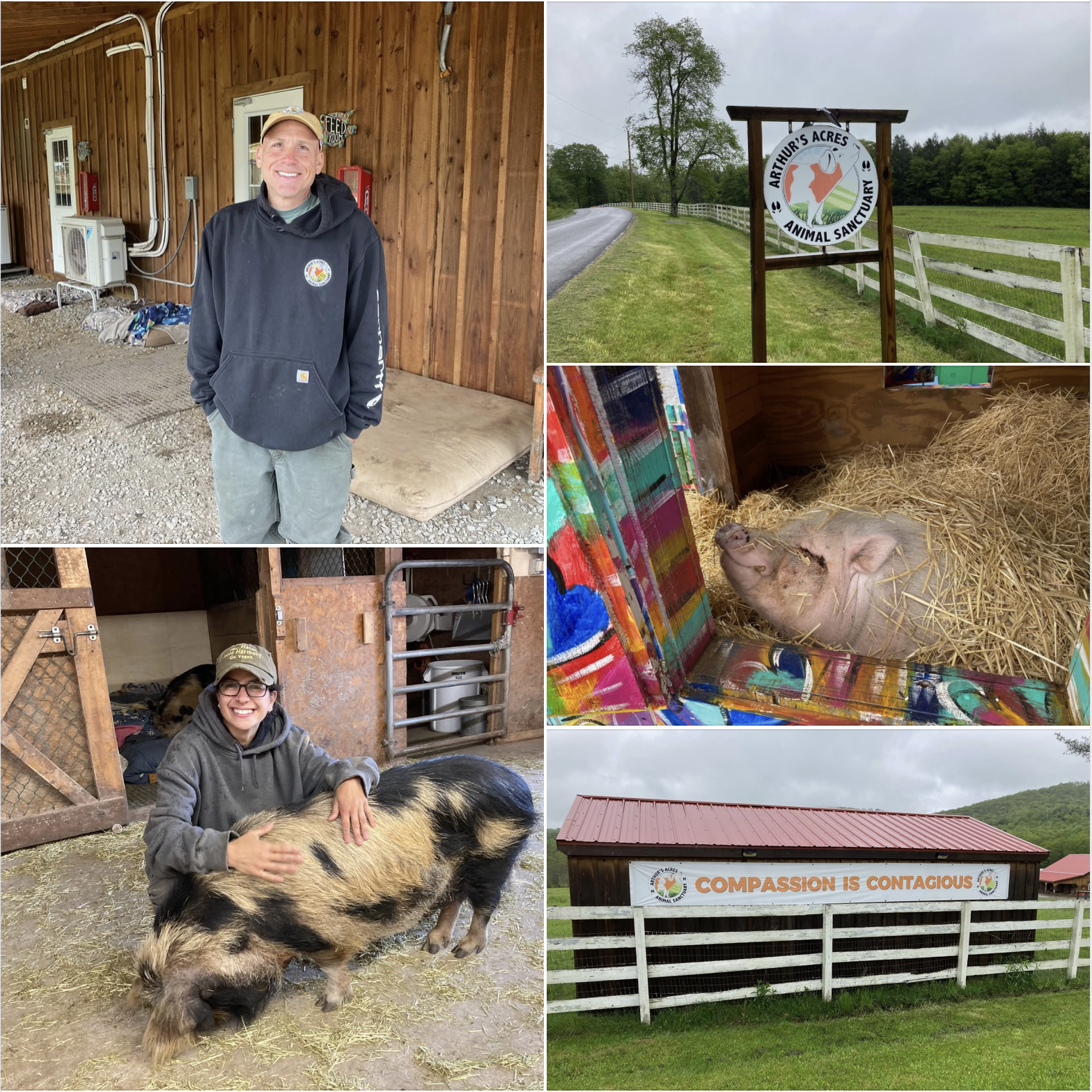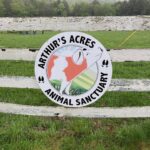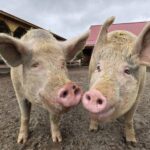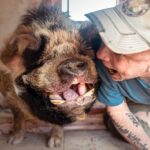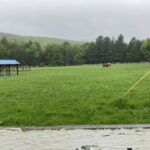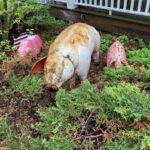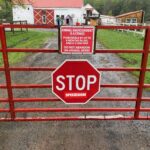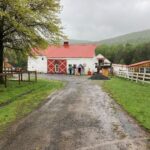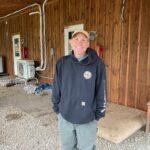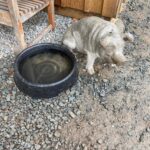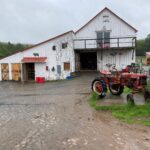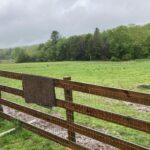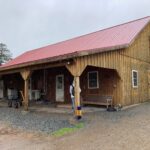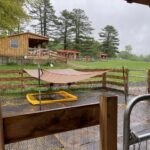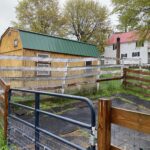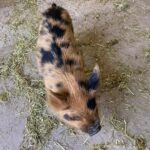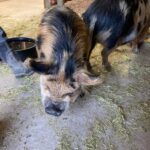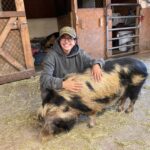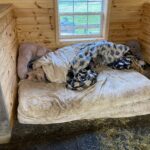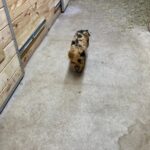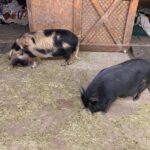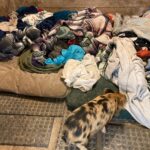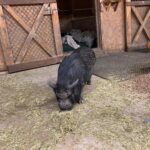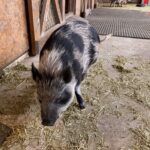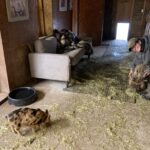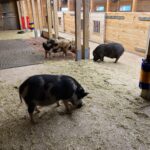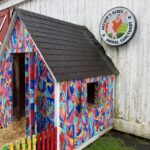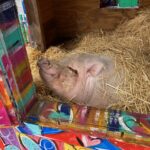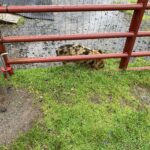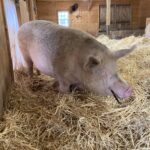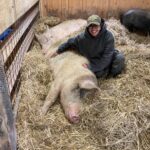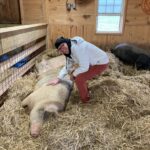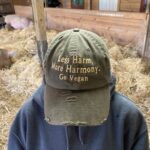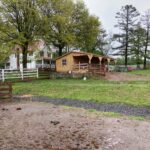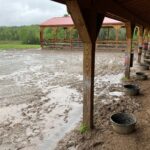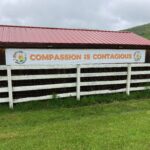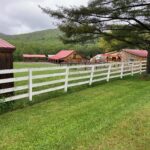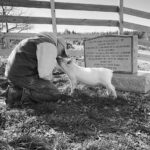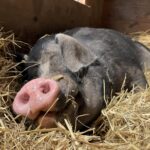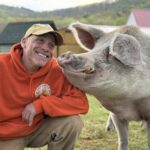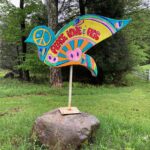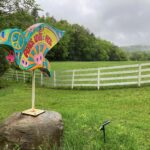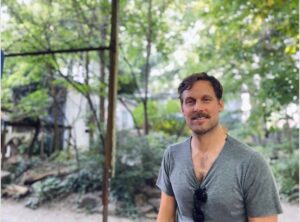Did you know that pigs outperform 3 year old children on cognition tests? And that Mother pigs sing to their babies when they nurse? Did you also know that pigs are cheerful, and can display emotions, and understand the emotions of others?
In other words, contrary to popular belief, pigs are awesome!
As per author John Robbins, “In our human blindness concerning the feelings, intelligence, and sensitivity of animals, there is one in particular about whom we’ve been most wrong. If it were possible to measure our misunderstanding about our fellow creatures on some giant scale, our ignorance of this particular animal might well be the greatest of all. This is an animal who has been abused and ridiculed by people for centuries but who is actually a friendly, forgiving, intelligent, and good-natured animal when he isn’t mistreated. I am talking, you may be surprised to find out, about the pig…To call a man a pig, or a woman a sow, is one of the worst insults in our common speech. This fact testifies not to the nature of pigs but to our beliefs about them and only shows how far out of touch we are with these animals. The commonly held image of pigs as greedy, fat, and filthy creatures, gross beasts who eat anything that isn’t fastened down, and who selfishly indulge their basest instincts without a trace of sensitivity, could hardly be further from the truth. Pigs actually have one of the highest measured I.Q.s of all animals, surpassing even the dog’s. They are friendly, sociable, fun-loving beings as well.”
Unfortunately, and despite the better angels of our nature, nearly 1.5 billion pigs are killed for “food” each year (as per Faunalytics, China kills more than 735 million pigs per year, while the US comes in second at over 128 million. Although China & the United States dominate pig slaughter globally, Denmark kills the most pigs per capita (about 2.4 pigs per year, per person)). And since consuming animal products is harmful to our health, animals, and our only planet (and not necessary for over 95% of the world’s population), these 1.5 billion pigs are basically raised and tortured for the sole purpose of satisfying a flavor preference. Way to go humanity!
Click here to learn more from Faunalytics.
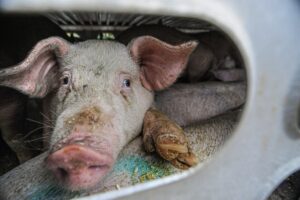
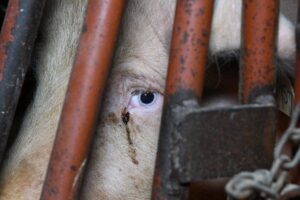 Image: Gemunu DeSilva
Image: Gemunu DeSilva
Arthur’s Acres Provides Peace, Love, and Hope
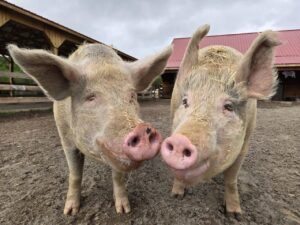 Image: Arthur’s Acres – Fay & Vivian
Image: Arthur’s Acres – Fay & Vivian
Thank goodness for wonderful animal sanctuaries like Arthur’s Acres (AA), in Parksville, NY. I was recently feeling even more depressed by the US-Israeli Genocide in Palestine, as well as job stress, and was desperate to be around animals, inspiring people, and our beautiful Mother Earth (I live in a big city, and no longer have pets). As a result, I took a trip to the coast of New England, the White Mountains of NH, and a couple of animal sanctuaries along the way (Vermont’s lovely Vine Sanctuary, and Arthur’s Acres). If love is indeed the best medicine, we definitely hit the trifecta! Our trip was more than medicinal and culminated at Arthur’s Acres, where we met the founder, Todd Friedman, Animal Care Specialist, Dani, and Animal Care Director, Christina John.
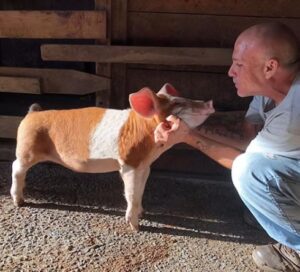 Image: Arthur’s Acres
Image: Arthur’s Acres
The story of Arthur’s Acres is remarkable, as the sanctuary is built on the very same property where animals had once been raised, and slaughtered, to meet the demands of a small-scale “farm to table” business. When Todd Friedman first visited the grounds, a real estate agent told him that there might be some animals on the site, including a “pig maybe”. Todd and his friend found little Arthur, who was “full of parasites, and left to starve”. As per Todd’s account on the Arthur’s Acres website, “Then and there I knew this was the place. It felt as if all of the animals, past and present on this property, were calling to us in that moment and asking us to help them. Arthur was their face, their voice. We knew we could do just that. And so, the journey began. Arthur’s Acres now stands, no longer a negative place, but one with an abundance of love, kindness, positivity and compassion. Arthur, who was the last pig to be threatened with death at this place, is the first pig to receive sanctuary here. The place where Arthur was meant to die young and afraid will be the place where he learns to live, to love, and be loved in return. He will welcome new friends, he will be a teacher, he will grow old here, and finally, he will die in his own bed surrounded by people who love him. I am up for the challenge, and I am lucky to have the support to help me do just that. There is a huge amount of work to be done, and we cannot do it with passion alone. Can you help make our dreams come true, for Arthur and for all the others out there waiting for help?”
Arthur’s Acres is currently the home to just under 70 animals, including 48 pigs (along with cats, dogs, and chickens).
Click here to meet the beautiful residents of Arthur’s Acres Animal Sanctuary.
The last seven years have not been easy for the difference makers who work at Arthur’s Acres. We learned that dead bodies and pieces of animals were everywhere on the 77 acre property, and that everytime something needed to be built, or a fence needed to be dug, more bodies, and body parts were found, and saved, oftentimes in buckets. Eventually, the Arthur’s Acres family erected a gravestone in the field, and had a mass burial for all the animals that were found over the years.
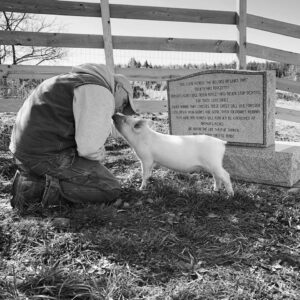 Photo by Isa Leshko Photography
Photo by Isa Leshko Photography
Here are the words that are written on the gravestone:
“This stone honors the billions of lives that society has forgotten
Arthur’s Acres will never forget and never stop fighting for those lost souls
Every animal that crosses these gates will live here forever
Long after their bodies are gone, their memories remain
Their love and beauty will forever be cherished at Arthur’s Acres
We honor the life they’ve shared, and the bond they’ve made “
– Paul Spampanato
*As per AA, “Only personal funds were used to pay for the stone . No donations…All donations go directly to the animals.”
Click here to learn more.
Interviews
Here are excerpts from interviews with AA Founder Todd Friedman, and Animal Care Specialist, Dani. 🙂
Interview # 1
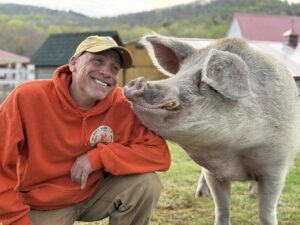 Image: Todd & Arthur (Arthur’s Acres)
Image: Todd & Arthur (Arthur’s Acres)
Question: What is one of your biggest challenges? My first thought is money, and funding.
Todd Friedman (TF): “It is so funny that you say that. Yes, 100%. We can’t do what we do without money. Our medical budget is probably in the top 5 of any sanctuary in the country. Cornell is 2 hours and 15 minutes away and we have an amazing on site vet, who is local and comes here. Anything more than that goes to Cornell. Last year our medical budget was $203,000. In addition, Insurance, capital improvements, payroll, I am a volunteer, I am the founder and executive director and I would never take a penny from here. I save my money. I have been working since I was 13 years old. I don’t live a very extravagant lifestyle. I don’t own anything, basically, anymore. I donate my heart to the sanctuary. I live in the house here. I live off my savings. When people ask if I should take a salary. I tell them that I am just going to donate it back. I am lucky to able to do what I do. Funding is really, really hard. There are not many grants for farm animal rescues. A lot of it goes to dogs and cats. And you can see with, we do a lot of fundraising. We have a big social media presence. YouTube, FB, Instagram, and all sorts of channels that we spend a lot of time on raising awareness. Of course it doesn’t directly reflect in the money, as dogs and cats still get a lot of the attention. So, it is definitely a struggle. We pride ourselves as a sanctuary not to overuse the word emergency. I feel like the word is overused in the rescue world. I think that our followers and supporters have become kind of numb to the word emergency. We have a different philosophy on how we do things. We do rely on monthly sponsorships, patreons. We try not to fundraise everytime an animal goes to the hospital. We try not to constantly have our hands out. We always say if we are going to put our hand out and ask you for something, we are going to try and give you something back in return. Whether it’s entertainment or happiness, we go live about 5 nights a week (facebook, instagram, and YouTube). We have a cooking show called Compassionate Cooking. We have a cooking blog on our website, Compassionate Cooking with Arthur’s Acres. We have special guests. We had a really big rock star cancel but they had to cancel, and I don’t want to say who it is. We just try to get our message of compassion out there. We don’t do it by berating people, or insulting people, or freaking people out with slaughterhouse pictures. We do it with compassion by showing that all of our animals have different personalities. We found that to be very successful. We let the animals speak for themselves. I get very frustrated when anybody uses the phrase voice for the voiceless. Anyone who has worked with animals, knows that they are not voiceless. And we know that what we do works because I get messages on a daily basis from people saying that they stopped eating meat, stopped eating pork, because of the animals here at Arthur’s Acres.”
Q. Most children love animals. When do kids start becoming less compassionate? How do we get kids and adults to care?
TF: “We have a different philosophy. We go about it in a compassionate way, but my patience is zero. I am fighting with the animals, and for them, and I am just amplifying their voice. Our approach is obviously showing the animals in a light where they have different personalities. We have Aunt Claire who is playing with a dog toy, and shaking it, and that is the kind of thing where we are planting the seeds. We do zooms with young classes, and we have camps up here, and I always believe that if you put a younger person in the right environment, they will come to the same compassionate conclusions. This is a long term battle, it’s not a war. We have to do what we can. I don’t focus on climate change. I focus on farm animals. That’s what I focus on. If I dilute that by everything else, it would make my message a little less strong. But that is where I am coming from, and I am in the trenches here. I have a captive audience and I am going to use the captive audience.”
Q. I agree with you, but arguably, the most destructive industry facing the planet is animal agriculture. And the disconnect in the peace, and climate justice movements with animals, is just as strong as the disconnect in the animal rights movement, with the climate and peace movements. Most people, it seems, are wonderfully compassionate in some ways, but unable to draw the connections in others. We all have a different approach, and we all tap into our different skill sets. Do you agree?
TF: “And like I said, I have the ammunition here with them standing right in front of me (smiles)”.
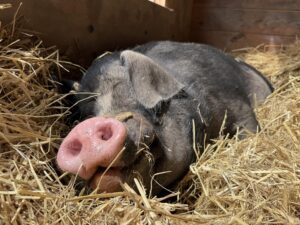 Image: Winslow taking a peaceful nap (AA).
Image: Winslow taking a peaceful nap (AA).
Q. Why should people come to Arthur’s Acres?
TF: “To meet the animals. Whether you are vegan, vegetarian, animal rights, whatever you are. We need to connect with animals that you are speaking with in the battle of abuse and neglect. Education wise, come here, learn about it. 80% of the people that come here are interested in having the conversation. Another 20% come here thinking that it’s a petting zoo. We tell people that maybe, if they start kind of talking about it that way, we say maybe you are not in the right place. On our website, we talk about how Arthur’s Acres is not a petting zoo. To meet the animals that would not be alive today in the outside world. Everybody would be past their expiration date. When people come here and they see an 800 pound pig, they’re like I have never seen a pig that big. It’s like yeah, because they are killed at 6 months old. So, we have no problem explaining that, and we do soften it when people have kids, but it is told to them. So it is just about education.”
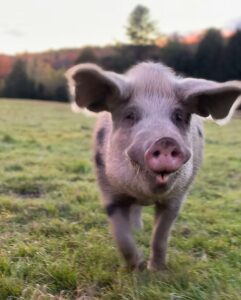 Image: Rue (AA)
Image: Rue (AA)
Q. What do you love most about what you do?
TF: “The animals obviously. These animals have been put in very bad situations. They have escaped slaughterhouses, they have escaped medical testing labs, they have been abused by people. They are very forgiving. Some take years, but most come around and they are grateful, and loving, and they are forgiving, and they are amazing. And they are no longer around people who don’t see. And you know, I always tell people that I can’t fault you for not knowing, but when you know, then we need to have a discussion. But if you know how these animals are treated, and you still continue to participate, then I am going to have an issue with the situation.”
Q. Does that tie in with willful ignorance?
TF: “100%. Willful ignorance is when you see cows on the side of a truck smiling, or happy pigs on a bacon package. If they knew what went into that once you explain it, then there will be an issue if you don’t change what you are doing. And I don’t expect an immediate change, but it’s a process. It’s a journey for everybody, and I am always happy to help people on their journey. That is why we have compassionate cooking and that is why I will talk to anybody who will listen. That is why we are here, so that you can meet the animals that you would potentially be eating. When you try and show, and put a face to the suffering, hopefully I am doing something better. Hopefully, I am showing them the way. I get messages on a daily basis from people saying people changed the way they live their lives because of us. It shows me that what I am doing is right. To bring it back to fundraising, and that motivates me to do more, and to make sure that we are going to be here for the long term. My dream, and I hope this is for most founders of sanctuaries, is that I am no longer needed. I hope it happens in my life. and I always say my dream is to have the last animal die off from natural causes here, I throw the keys in the door and you never see me again. This isn’t an ego trip, I don’t need my face in front of the camera, I am just telling a story. I wanted to speak for the animals. It is not my desire to be famous. If one day the world went vegan, and these animals didn’t need a home, and everybody lived safe, you would never see my face again. I would be done.”
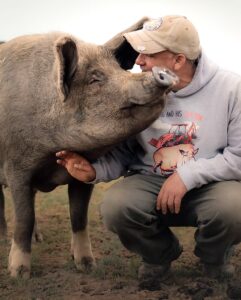 Image: Prim & Todd (AA).
Image: Prim & Todd (AA).
Q. Todd, I am struck by your humility and optimism. I learned from Kurt Vonnegut, that both Mark Twain and Albert Einstein, at the end of their lives, had given up on humanity, and our species, but it sounds like you haven’t.
TF: “I am not the most positive person in the world, and I do get sad in certain situations but I do see the happy things too. Just a quick story, we have a pig at Cornell, Dorothy, whose sister, Belinda, went with her, and they are like one year old Visayans, who are about 100 pounds each. They have a vet, and the vet students who look after them with feedings. I got a messagge from the doctor that the vet students are obsessed with them. It is their first interaction with pigs, and they are obsessed. And that is a seed that we planted. And that could change the trajectory of the vets careers, finding a passion for pigs when you are meeting these two amazing animals. Maybe even a vegan vet, or a vegetarian vet, who decides to work for sanctuaries, decides to do other stuff to help. We are extending the lives of these animals who are born to die at 6 months, in a healthy way as well. Every time you feel that you wake up, and you open your eyes, and you are feeling a little beat up, and then you get a story like that, it adds some energy, and you’re like okay, I live to fight another day. So, we are trying.”
Todd, thank you so much for everything you do!
Interview # 2
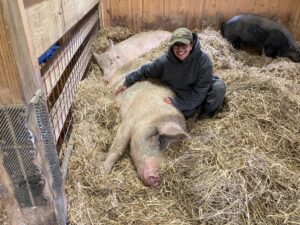 Animal Care Specialist, Dani.
Animal Care Specialist, Dani.
Dani is all heart, and wise beyond her years. She gave us a tour of the property, and couldn’t have been more gracious.
Thank you again Dani. 🙂
Here are a few excerpts from the interview with Dani:
Q. Dani, what made you become vegan and when did you start caring about animals?
Dani: “When I was in school, I was between 8 and 10, and we were in history class. There was a quick blurb where they were shuffling cows into a chute, and they were smacking their butts, and the cows were screaming. I went home and I asked my Mom what I thought I saw, I was confused by it. She said, the hamburgers, and cheeseburgers and things that you eat, that is where it comes from, the cows. And I was like, oh my God, no way, and I was very lucky because my Mom was a vegetarian. But I would have meat at my Grandmother’s house and at friend’s houses and things like that. At the very moment, when she told me that, I said, I am not eating meat anymore, no way, that is so weird. I love cows, why would I do that? So, I stopped eating meat, and fish when I was between 8 and ten years old. So, then as I got older, I cut out eggs. I would never drink straight up milk but I was eating products with milk. About 7 years ago, I completely made the switch to veganism at the age of 22. I went straight to work at animal shelters out of high school, and I made sure all of my clothes were vegan too. About 2 years into being vegan, I realized that I could do more. I started to do more research on activists groups. I sort of dove head first into activism. Aside from working here, it’s like my full time job. I am now an activist as much as I can be, and doing protests, and raising awareness. I am not sure if you are familiar with different types of activism, there is community outreach, radical stuff, disruptions, pressure campaigns, and I kind of do all of it. I am my own kind of activist that floats between groups, and it makes me feel so accomplished when we actually win. Mark Jacobs, and Alexander Wang, actually were freed because we were pushing hard for that, so, it actually makes me feel like I am making more of a difference than just by diet.”
Q. That is beautiful. Your full time work is a form of activism. They say every decision we make is a form of activism, whether we care to exercise that ability or not.
Dani: “Right, and working at a sanctuary is a more gentle approach. Instead of preaching, you can say hey, this is Brutus, this is what happened here, and he is a really cool pig, and did you know that pigs blah, blah, blah..And you know, it touches people in a different way rather than showing them videos of a slaughterhouse. So, it is a different form of advocating.”
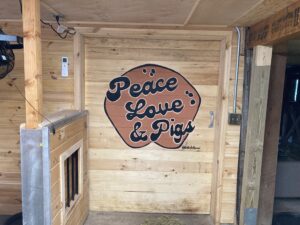
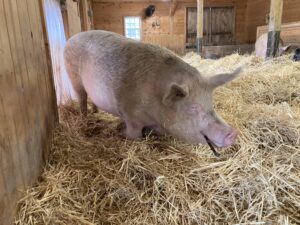
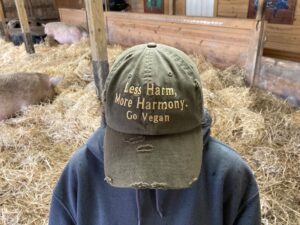 Dani’s message on her hat.
Dani’s message on her hat.
Q. How do we get people to care, or rather, what role does love play in the work that you do? Is that a dumb question?
Dani: “No, it is everything. I wouldn’t be here if it wasn’t for love, to be honest. I love these animals as much as I love my own animals. You really see these animals come out of their shells by showing them love. The majority of these animals have come here really traumatized physically and mentally. And to see them kind of slowly trust you, and by showing them compassion, and showing them love, you can lay on them, and hug them, and kiss them, and they trust you. You know? Love is everything, and we need more of it. Especially when it comes to animals. So, not a dumb question. It is everything.”
Q. Comedian Julio Torres once said that the reason he went vegan was because he realized that he had too many friends! I would love to hear your thoughts on that aspect of it. In other words, if somebody is considering fighting for animals, or another social justice movement, how does she or he, reconcile the price? Knowing the different kinds of activism that you do, as well as the kind of passion, and love that you seem to have for all beings, I bet that it has cost you friends, and relationships. How do you deal with that at the end of the day?
Dani: “(laughs) Fair, it is one way to get rid of friends, that is for damn sure! I do have to say that I am very fortunate to still have the friends that I have had for 15 years who are still supportive. Not vegan, but supportive. However, I have had a lot of heat on social media about it from people that I went to high school with, or people that I was friends with who fell out before I went vegan. I am known as the crazy, extremist vegan, you know, who shoves her opinion down everyone’s throat, blah, blah, blah. At the end of the day, I am fighting for peace. I have come to terms with it. In the beginning it was hard, I was like, why are all these people so mean to me, I just love animals? And then as I have matured in my role as an activist, I am like, if you don’t like me, that is fine, if you want to support mass holocaust, essentially, of these animals, that is on you. I am cool. I know at the end of the day that I am fighting for what is right. And I kind of don’t care anymore. But I do get comments that are tough, and it is hard, but it is mass genocide of killing innocent sentient beings. My therapist had said, “let your passion fuel your progress”, and I really like that, because it plays in my head all of the time. Like we said, I was upset about people having their comments and stuff, and now I am like, no, I love it. I am good. I am doing what’s right. That is something they have to live with. I don’t.”
Click here for a clip of Julio Torres talking about the hardest part about being vegan.
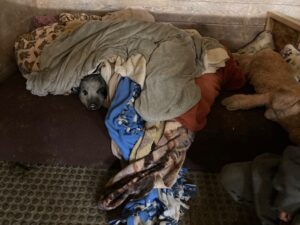
Q. Beautifully said. Why should people come to Arthur’s Acres?
Dani: “Oh my Gosh. You should come to Arthur’s Acres because it is full of Love. And you get to see how these animals are meant to be treated. And you get to see them in their natural element, displaying their natural behaviors. It will really open your eyes to how these pigs are sentient beings just like your dog or cat. They know their names. They sleep on a couch under a blanket. They use a litter box. They are way more similar to companion animals than you think they are. It will change your life I think.”
Q. Where do you see yourself in 5-10 years?
Dani: “I hope to have my own animal rights group. Hopefully, start my own kind of PETA, essentially. Maybe a sanctuary one day, Maybe a little bit of both. I just hope in 5 years that I have changed at least 5 lives. If I could convert 5 people to being vegan within those 5 years, I would be content.
Q: I love it. Well, I have known you for less than an hour, and I am not just saying this. I would bet on you. For real.
Thank you again Dani, for all that you do! 🙂
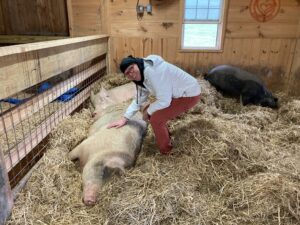
If saving the lives of highly intelligent, and fun loving animals like pigs isn’t enough to deter you from eating animal based foods, please consider the human health, and environmental implications as well.
Human Health
Dr. Dean Ornish had this to say about the legendary Dr. T. Colin Campbell, “Everyone in the field of nutrition science stands on the shoulders of T. Colin Campbell, who is one of the giants in the field. This (The China Study) is one of the most important books about nutrition ever written, and reading it may save your life.”
Here is an excerpt from The China Study on the difference between animal and plant based nutrients:
“What made this project especially remarkable is that, among the many associations that are relevant to diet and disease, so many pointed to the same finding: people who ate the most animal-based foods got the most chronic disease. Even relatively small intakes of animal-based food were associated with adverse effects. People who ate the most plant-based foods were the healthiest and tended to avoid chronic disease. These results could not be ignored. From the initial experimental animal studies on animal protein effects to this massive human study on dietary patterns, the findings proved to be consistent. The health implications of consuming either animal or plant-based nutrients were remarkably different.” ― Dr. T. Colin Campbell
Click here to learn more from Dr. Campbell (via LiveKindly), on how meat and dairy products cause cancer.
Click here to learn more from Dr. Michael Greger on how processed meat, like bacon, causes cancer.
Climate Justice
As per Oxford University’s Joseph Poore, “A vegan diet is probably the single biggest way to reduce your impact on planet Earth, not just greenhouse gases, but global acidification, eutrophication, land use and water use…It is far bigger than cutting down on your flights or buying an electric car…Agriculture is a sector that spans all the multitude of environmental problems. Really it is animal products that are responsible for so much of this. Avoiding consumption of animal products delivers far better environmental benefits than trying to purchase sustainable meat and dairy.”
Click here to learn more.
Final Thoughts
“I have a friendly feeling toward pigs generally, and consider them the most intelligent of beasts, not excepting the elephant and the anthropoid ape…I also like his attitude toward all other creatures, especially man. He is not suspicious, or shrinkingly submissive, like horses, cattle and sheep; not an impudent devil-may-care like the goat; nor hostile like the goose; nor condescending like the cat; nor a flattering parasite like the dog. He views us from a totally different, a sort of democratic standpoint as fellow-citizens and brothers, and takes it for granted, or grunted, that we understand his language, and without servility or insolence he has a natural, pleasant, camerados-all or hail-fellow-well-met air with us.” – W.H. Hudson, The Book of a Naturalist (1919).
And speaking of naturalists, in his book, The Whole Hog, Naturalist Lyall Watson, had this to say about pigs: “I know of no other animals that are more consistently curious, more willing to explore new experiences, more ready to meet the world with open mouthed enthusiasm. Pigs, I have discovered, are incurable optimists and get a big kick out of just being.”
A Pig Named Priscilla Saves a Boy’s Life
Finally, I had to share one more passage from John Robbins’ game changing book, Diet for a New America. Even though Mr. Robbins has been a complete disappointment, with regard to his silence on the US-Israeli Genocide in Palestine, he did write a couple of game changing books, Diet for a New America, and The Food Revolution, which altered the trajectory of my life (along with The China Study, and a few others). And for that, I am forever humbled, and grateful. Nonetheless, the continued silence and complicity of the vegan movement is unforgivable.
Click here to learn more about how the US-Israeli Genocide in Palestine exposes the vegan movement’s true colors.
Here is the story of Priscilla, the amazing pig who saved a boy’s life: “A couple of years ago United Press International carried a photograph and story that were picked up and printed in many of the country’s major ewspapers. The photo was of Carol Burk; her 11-year-old son, Anthony Melton; and a pig. What made the story newsworthy was that mother and son had gone swimming in a Houston lake. The boy had inadvertently strayed too far from shore, panicked, and begun to sink. The boy’s pet pig, Priscilla, had evidently felt his distress because she rushed into the water and began to swim toward him. While Anthony’s anguished mother watched helplessly, the boy managed to stay afloat until the pig reached him. Then he caught hold of her leash. Anthony’s mother watched awestruck as Priscilla the pig proceeded to tow her son safely to shore.” – John Robbins, Diet for a New America
Wow. What else is there to say? Pigs rock, and Arthur’s Acres rocks for pigs!
Click here to make a donation to Arthur’s Acres Animal Sanctuary.
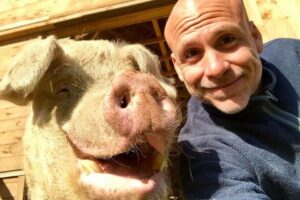
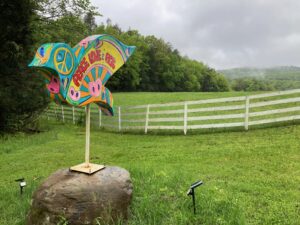 Image: Peace, Love, and Pigs at Arthur’s Acres.
Image: Peace, Love, and Pigs at Arthur’s Acres.
Thank you again to the entire family at Arthur’s Acres (both 2 legged, and 4 legged).
The bottom line? Pigs are AWESOME, and there is no better time than right now, to adopt a plant-based diet, reduce their suffering, and improve your health. I promise that you will feel better in about 1.5 billion different ways (again, that is how many pigs are tortured and slaughtered each year due to our violent and destructive “food” system). How can you not love pigs, and all animals? It was great to meet everyone at Arthur’s Acres, and to hear their stories. We left feeling encouraged, and refreshed, and I am sure that you will too.
Until next time…
Other Sources:
Click here for the Arthur’s Acres Animal Sanctuary website.
Click here for the Arthur’s Acres Patreon Account.
Click here for the Arthur’s Acres Facebook account.
Click here for the Arthur’s Acres Instagram account.
Click here for a video of a mother pig singing to her babies.
Click here to learn more about Pig intelligence from Mercy for Animals.
Click here for 14 facts about Pigs from Farm Sanctuary.
Click here to learn more about Pigs from Sentient Media.
Click here to learn more about John Robbins’ game changing book, Diet for a New America.
Click here to learn more from PETA about Pig Intelligence.
Click here to learn 10 things you didn’t know about pigs from PETA (1:21).
Click here to learn more from Faunalytics about pig slaughter.
Click here to learn more from Faunalytics about animal slaughter.
Click here to learn more about Dr. T. Colin Campbell.
Click here to learn more about Arthur’s Acres Animal Sanctuary from The Animals Voice.
Click here to learn more from Mercy for Animals on how Pigs are driven mad by extreme confinement.
Click here for PETA’s 11 reasons why you may never eat bacon again.
Click here to learn more about Priscilla, the Life Saving Pig.
Free Palestine!


